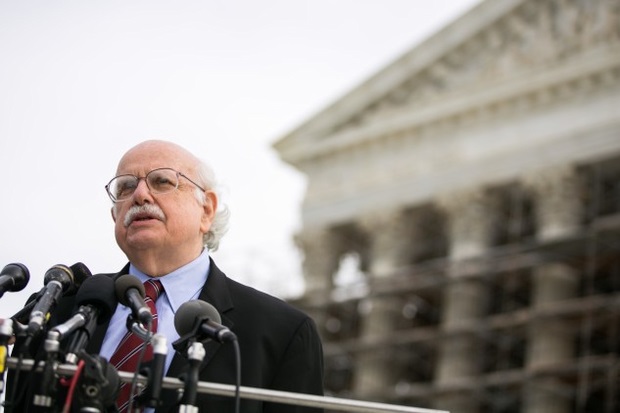Democrats’ Bill Would Offer $5 Million-Per-Candidate Bonanza
- Small-donor matching funds aim to curb big-money influence
- Critics say taxpayer funding wouldn’t limit what big donors give
House Democrats, who promised to get big money out of politics, are preparing to vote on providing public financing for congressional races, a move that could pump millions of dollars of taxpayer money into those contests.
Public funding for candidates for Congress is included in legislation (H.R. 1.) that Democrats plan to bring to the floor next month. The bill also would revive an existing but little-used public financing program for presidential campaigns.
The legislation would let eligible congressional candidate qualify for nearly $5 million each in federal matching funds, according to a Bloomberg Government analysis. The money would come from direct congressional appropriations.
Under the bill, in any election cycle the amount of public funding each candidate could get would be capped based on recent campaign spending totals. That cap would be determined by averaging what was spent by the 20 most expensive winning House campaigns in the previous cycle, rounded to the nearest $100,000. The cap then would be set at half of that figure.
Candidates could receive an additional matching payment of as much as $500,000 based on small donations received during the final 60 days before the general election.
Based on what was spent in the 2018 election, that would work out to a cap of $4.5 million, plus the small-donor bonus.

Supporters say public campaign financing could curb the influence of big donors by making it easier for candidates to rely on small contributions from people who give no more than $200.
A small-dollar matching fund system “is essential to end candidate dependency on big money funders and empower ordinary Americans,” said Fred Wertheimer, president of Democracy 21 and a veteran supporter of strong campaign finance regulations.
Critics see a potentially huge expense for taxpayers with no guarantee that it would curb the influx of outside money into campaigns. Spending ceilings are out because of a series of court decisions, including the 2010 Supreme Court ruling in Citizens United v. FEC, which found that such limits violate the First Amendment.
Because of the court rulings, any new public financing program must provide enough money that a candidate voluntarily taking public funds and relying on small donors can compete with unlimited outside spending groups and candidates relying on larger donors.
Rising Spending
Even supporters say the bill would do nothing to directly limit congressional campaign spending, which reached a record level of more than $5 billion last year — 35 percent higher than the last midterm elections in 2014.
Public financing programs “may `succeed’ at giving away tax dollars to politicians,” David Keating of the nonprofit Institute for Free Speech, wrote in a recent analysis. “But they fail at just about everything else.” His group opposes campaign finance regulations.
In addition to campaign finance provisions, the Democrats’ 571-page bill also proposes a wide range of changes in rules for voting , government ethics, and lobbying.
BGOV Bill Summary: H.R. 1, Voting, Campaign, and Ethics Package
Of all the provisions in the bill, the public financing of campaigns have the potential to be the most costly — provided future Congresses are willing to provide the money.
While public financing would be available to candidates from both parties, Democrats could be especially helped by a system that rewards small-donor fundraising. Smaller contributions — especially to Democratic candidates – skyrocketed in the 2018 midterms, driven largely by opposition to President Donald Trump and facilitated by online giving.
Public financing for Senate campaigns could be fleshed out if that chamber takes up the House bill. Senate Majority Leader Mitch McConnell (R-Ky.) who has opposed previous campaign finance revamping efforts, has said the House bill . He has “is not going to go anywhere.”
Presidential Financing
The bill also seeks to revive a largely discarded presidential public financing system. The program would continue to rely on taxpayers checking a box on their tax forms to fund campaigns for the White House. However, candidates could receive 6-to-1 public matching funds up to $250 million maximum — rather than a dollar-for-dollar match under the old system — with no limits on spending.
Qualifying candidates would have to limit contributions to $1,000 from each donor, with the first $200 eligible to be matched by public money. Candidates who forego public money could take up to the $2,700 per-election limit from individual contributors or $5,000 from political action committees.
The Congressional Budget Office hasn’t yet released a score of the bill’s potential cost.
The measure also includes longstanding Democratic proposals to provide more disclosure for those funding super political action committee and other campaign spending groups, as well as new limits on coordination between these groups and candidates. The measure would restructure the Federal Election Commission to strengthen enforcement of campaign finance rules.
Hearings on the measure are set to begin soon in the House Administration, Judiciary and Oversight and Reform committees.
Wertheimer, who has been involved in every major campaign finance legislation since the Watergate scandal, noted that it took five years to pass the 2002 McCain-Feingold law (Public Law 107-155). It could take that long to enact the new proposals, too, he said at a Capitol Hill news conference last week.
To contact the reporter on this story: Kenneth P. Doyle in Washington at kdoyle@bgov.com
To contact the editors responsible for this story: Katherine Rizzo at krizzo@bgov.com; Bennett Roth at broth@bgov.com